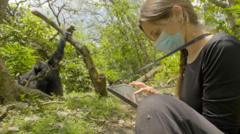New observations in Budongo Forest reveal wild chimpanzees utilizing various medicinal plants for treating injuries, shedding light on their self-medicating behaviors and potential empathy towards others in their species.
Chimpanzees Show Remarkable Use of Natural Remedies in Uganda

Chimpanzees Show Remarkable Use of Natural Remedies in Uganda
Researchers document wild chimps employing medicinal plants for self-care.
Chimpanzees in Uganda have recently been filmed demonstrating a remarkable understanding of nature, specifically by using medicinal plants to care for their wounds and other injuries. In a groundbreaking study, scientists from the University of Oxford collaborated with local teams in the Budongo Forest, thoroughly documenting instances where these primates employed plant-based remedies, both on themselves and on other chimps.
Building on previous findings, the researchers discovered that these chimps intentionally seek out and consume certain plants known for their healing properties. In their extensive catalogue, the team outlined various methods of “forest first aid” practiced by the chimps, noting that their findings are published in the journal Frontiers in Ecology and Evolution. This research contributes to a wider understanding of how primates, including chimpanzees, orangutans, and gorillas, utilize natural resources to maintain health in their wild environments.
Lead researcher Dr. Elodie Freymann emphasized the diverse repertoire of behaviors chimpanzees exhibit when injured or ill. "They dab plants on their wounds or chew them and apply the paste to cuts," she explained. The researchers captured footage of a young female chimp engaging in this behavior, applying chewed plant material to her mother’s injury.
Interestingly, researchers also found evidence of chimps providing care to other group members, even those they are not genetically related to. Dr. Freymann pointed out this observation as a significant indication of the capacity for empathy within the species. This line of research stems from a logbook maintained at the field station, chronicling decades of observations since the 1990s. The anecdotes include everything from chimpanzees dabbing leaves on injuries to cleaning themselves using leaves after defecation.
Furthermore, through previous studies, the team identified and tested specific plants that chimpanzees were observed consuming when injured, many of which exhibited antibacterial properties. The broader implications of this research suggest that understanding ape behavior could also lead to new medicinal discoveries.
Dr. Freymann reflected on the comparative survival strategies of chimpanzees and humans in the wilderness, stating, "If I were here without food or medicine, I doubt I'd last long, especially when injured." In contrast, chimps thrive in their environment because they possess the knowledge to utilize their surroundings effectively.
These poignant insights challenge human perceptions of the natural world and underscore the intricate relationships primates have with their environment. As research continues, it becomes increasingly clear that chimpanzees may have much to teach us about medicine and survival in the wild.



















